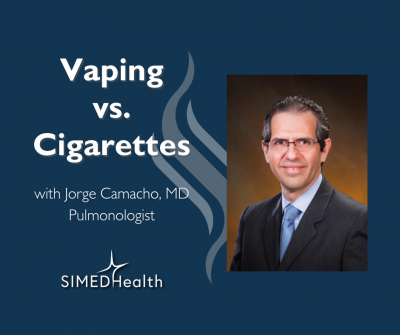
How Vaping Affects Lung Health
Some smokers have switched from cigarettes to vapes. However, without years of health data, how can we determine if vaping is indeed safer than smoking? Dr. Jorge Camacho, a SIMEDHealth Pulmonology physician, examines how vaping affects lung health.
To learn more about SIMEDHealth Pulmonology, click here.
1. What are the potential health risks of vaping?
The risks related to vaping are due to the exposure of nicotine as well as to other aerosol components produced by the devices, as well of the risks associated with the actual devices.
2. How does vaping affect the lungs differently from smoking cigarettes?
Even though nicotine vaping does not expose the user to many of the constituents of cigarette smoke (e.g., tars oxidant gases and carbon monoxide), they do contain potential toxic chemicals associated with a variety of harmful lung conditions. The risk of cancer is likely lower than cigarettes, however we do not have long term studies examining the risk of cancer and vaping.
3. Are there specific lung conditions or diseases that can be exacerbated by vaping?
Patients with chronic lung conditions such as asthma or COPD are more likely to experience complications from vaping.
There is also a severe lung condition associated with vaping which have caused multiple hospitalizations and fatalities. The CDC recognizes this as e-cigarette vaping associated lung injury (EVALI), there is also another typer of pneumonia call eosinophilic pneumonia associated with vaping. The thinking is the chemicals in the aerosol carrier are responsible.
4. Can secondhand inhalation of vaping affect a non-vapers' lung health?
There are concerns but there is limited evidence of the health effects associated with passive e-cigarette aerosol exposure. Vaping does produce small increases in serum cotinine which is a byproduct of nicotine in exposed individuals. In general, the exposure is expected to be less toxic to bystanders than conventional cigarette smoke.
5. Are there alternative methods for nicotine delivery that are less harmful to lung health?
No e-cigarette has been approved by the FDA for smoking cessation.
Nicotine replacement therapy (NRT) is the recommended strategy, the nicotine can be delivered by several methods including skin patches, nicotine gum and lozenges, which are over-the-counter medications. No harmful effect on lung health is associated with these.